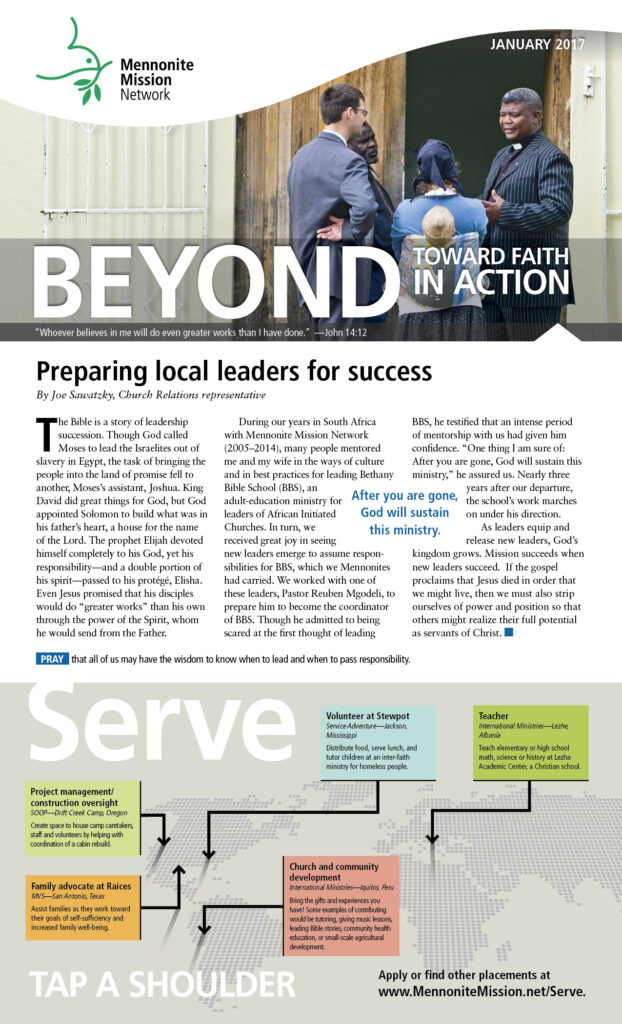The Bible is a story of leadership succession. Though God called Moses to lead the Israelites out of slavery in Egypt, the task of bringing the people into the land of promise fell to another, Moses’s assistant, Joshua. King David did great things for God, but God appointed Solomon to build what was in his father’s heart, a house for the name of the Lord. The prophet Elijah devoted himself completely to his God, yet his responsibility—and a double portion of his spirit—passed to his protégé, Elisha. Even Jesus promised that his disciples would do "greater works" than his own through the power of the Spirit, whom he would send from the Father.
During our years in South Africa with Mennonite Mission Network (2005–2014), many people mentored me and my wife in the ways of culture and in best practices for leading Bethany Bible School (BBS), an adult-education ministry for leaders of African Initiated Churches. In turn, we received great joy in seeing new leaders emerge to assume responsibilities for BBS, which we Mennonites had carried. We worked with one of these leaders, Pastor Reuben Mgodeli, to prepare him to become the coordinator of BBS. Though he admitted to being scared at the first thought of leading BBS, he testified that an intense period of mentorship with us had given him confidence. "One thing I am sure of: After you are gone, God will sustain this ministry," he assured us. Nearly three years after our departure, the school’s work marches on under his direction.
As leaders equip and release new leaders, God’s kingdom grows. Mission succeeds when new leaders succeed. If the gospel proclaims that Jesus died in order that we might live, then we must also strip ourselves of power and position so that others might realize their full potential as servants of Christ.
5 tips for passing the leadership baton
By Lynda Hollinger-Janzen, Mission Network staff writer
In 2009, Reuben Mgodeli and Anna and Joe Sawatzky were laying the groundwork for a leadership transition at Bethany Bible School. I had the privilege of watching it happen. Their successful transition provides a model for situations where we are mentoring or being mentored.
1. Shared vision. They shared a common Christian commitment to learn from God’s word, the Bible, and to apply it in the context of their communities around Mthatha. The Sawatzkys learned to preach and dance in ways that were understood by the Bethany Bible School participants. Rev. Mgodeli was open to thinking beyond "this is the way we’ve always done it."
2. Listening posture. Mgodeli and the Sawatzkys realized they had a lot to learn from each other, leading to mutual mentoring and mutual conversion.
3. Radical hospitality. In an era where apartheid habits are still practiced, the Sawatzkys had an open home where people of all races ate, lived and prayed together. If we, too, get outside our comfort zone to eat, share and learn from people who are different from us, it opens our minds to different ways of doing things … even different ways of leadership.
4. Mutual respect. "Our ministry of presence brought everything together. [A common Mission Network phrase] ‘Be the Gospel’ is great. It’s a way of being with people, showing respect at every level," Anna said.
5. Recognizing another’s gifts. "I believe that good leadership gives people confidence in a leader, but a great leader also gives people confidence in themselves. That’s what I want to do," Mgodeli said.

